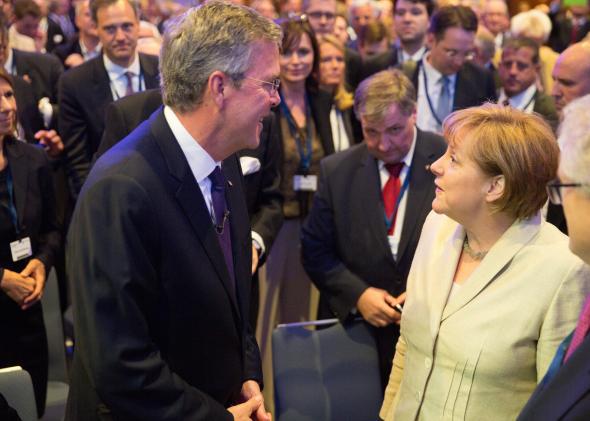Iraq has already been a tough subject for Jeb Bush, given his brother’s controversial legacy. Judging by his remarks in Germany today, where he is making the first stop on a European trip that will also include visits to Estonia and Poland, he’s having some trouble articulating a position on Russia as well.
When talking about countering aggression from Russia, Bush implied that he would handle things differently than the current president but didn’t quite explain how.
Speaking with reporters, Bush called Russian president Vladimir Putin a “bully” and said the U.S. and Europe should be “resolute” in responding to him.
“Ultimately I think to deal with Putin you need to deal from strength - he’s a bully and … you enable bad behavior when you’re nuanced with a guy like that… “Just being clear - I’m not talking about being bellicose - but saying ‘here are the consequences of your actions’, that would deter the kind of bad outcome we don’t want to see.”
Based on what we’ve heard from both Bush and his rivals so far, voters should be prepared to expect quite a few paeans to resoluteness and negotiating from a position of strength this primary season. The “nuanced” line is a not-so-thinly veiled shot at the Obama administration. In a speech before an economic conference hosted by Chancellor Angela Merkel’s Christian Democratic Union party, Bush also referred to potential rival Hillary Clinton’s attempts to normalize diplomatic relations with Russia during the first Obama term saying, “We’re beginning to realize the reset button didn’t turn out so hot.”
The reset button is a fair target for a presidential candidate—though Bush should probably be careful about getting into the topic of presidents who’ve misjudged Putin’s intentions. Still, the criticism feels a bit out of date. Obama wasn’t exactly “nuanced” in his own speech in Germany earlier this week when he accused Putin of wrecking his own country to “recreate the glories of the Soviet empire.”
It’s valid to argue, as Bush did, that U.S. sanctions have not done enough to deter Russian aggression in Ukraine and that more military support should be given to countries bordering Russia. But Bush purposely avoided calling for unilateral U.S. intervention, saying, as the Obama administration has, that responsibility for Europe’s defense lies with NATO.
In his speech, Bush pivoted from calling for the U.S. to act “more robustly” to praising Merkel for her “efforts to be clear about sanctions as it relates to Russia.” But the hawkish actor in this situation has been Obama not Merkel. For months, western European leaders, particularly Merkel, were reluctant to put severe economic sanctions in place on Russia, resisting the Obama administration’s entreaties to get tougher on Putin. The chancellor and her allies eventually came to support tougher sanctions last summer after the downing of the Malaysian passenger jet in Ukraine, but she has still been reluctant to support more aggressive anti-Russian action such as providing military aid to the Ukrainian government. The contrast between Merkel’s approach and Obama’s has been so striking that reporters asked earlier this year if they were intentionally pulling a “good cop/bad cop” routine on the Russians.
Bush’s rhetoric in Berlin suggests a fantasy reality in which it’s Merkel who’s been “resolute” in confronting the Russians and Obama who’s been urging reconciliation. I guess that’s better for his campaign.
